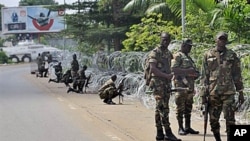A leading member of groups supporting Ivory Coast’s former Prime Minister Alassane Ouattara said they will take over the country’s state broadcaster Thursday, despite threats of violent clashes with the army following the disputed 28 November presidential run-off vote.
The state broadcaster is reportedly controlled by supporters of President Laurent Gbagbo. But, Michel Koffi, in his words, told VOA members of his group are fully prepared to fight for their rights and freedoms after accusing President Gbagbo of destabilizing the country.
“Since the 28th November of this year, Mr. Alassane Ouattara has been elected as president of Cote d’Ivoire, and then we gave the chance to democracy and gave the chance to diplomacy to solve the problem. But, Mr. Gbagbo is not ready for that. So, today, we are ready to take over the national television of Cote d’Ivoire,” said Koffi.
Analysts have expressed concern that the decision to “forcefully” take over the state broadcaster could lead to violence and worsen the ongoing political crisis.
Koffi said his group aims to stop supporters of President Gbagbo from using the state broadcaster to misinform the entire Ivoirian population about the disputed vote.
“They are now using the national TV [television] and radio to send wrong information [to] the population. Don’t forget that about 75 percent of Cote d’Ivoire [population] has to [watch] the national TV, [but] they are talking nonsense on this television and we have to stop that,” said Koffi.
“They are showing wrong movies to show people that we are ready to [commit] genocide and all that. But, we are not in that and we have to stop that because we voted for Mr. Ouattara to give the chance to Cote d’Ivoire for development…and democracy and freedom in Cote d’Ivoire,” added Koffi.
Both President Gbagbo and Mr. Ouattara have declared they are president and named governments raising fears of a new conflict eight years after the country’s civil war.
The two leaders have the support of rival armed forces. Mr. Gbagbo is supported by senior military officers, who control the south, while Mr. Ouattara has the support of former rebels in the north.
Meanwhile, U.N. Secretary-General Ban Ki-moon said he is deeply concerned about the threat of violence in Ivory Coast as a result of that country's continuing political stalemate.
In a statement through his spokesman Wednesday, Mr. Ban said recent developments have created a politically charged environment where actions could have “unpredictable consequences,” including the renewal of civil war. He also called on all parties to avoid any action that could trigger violence.








